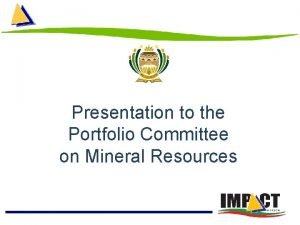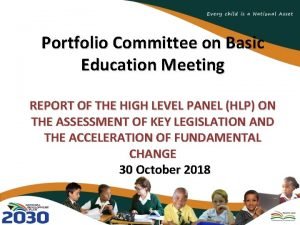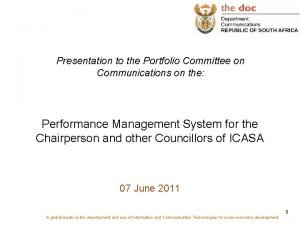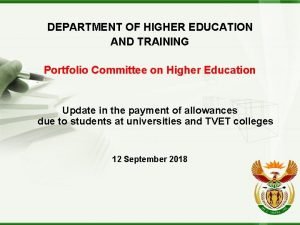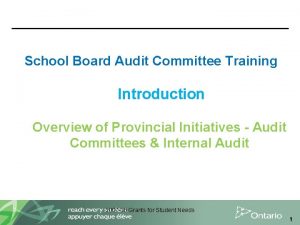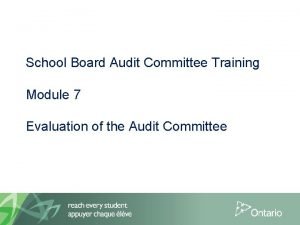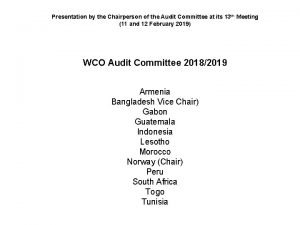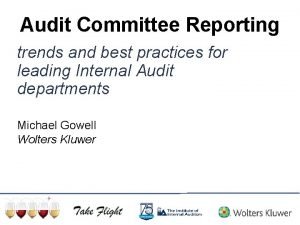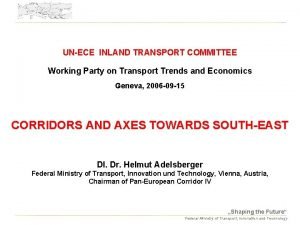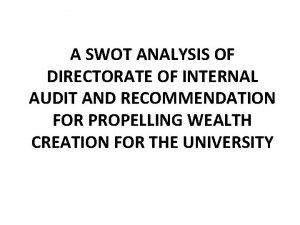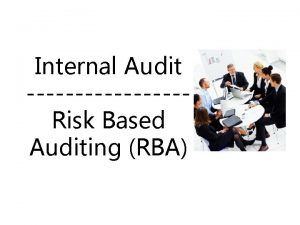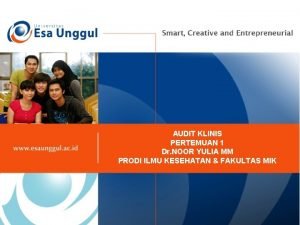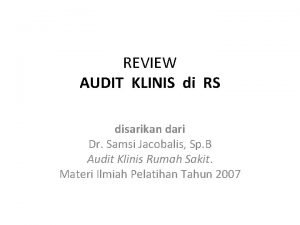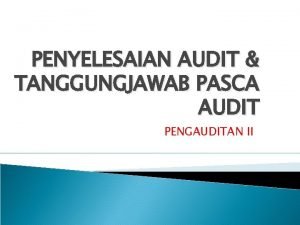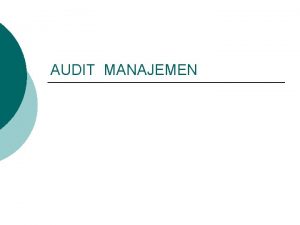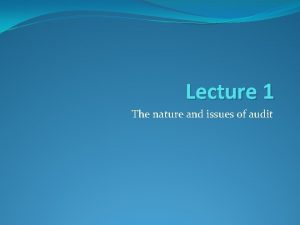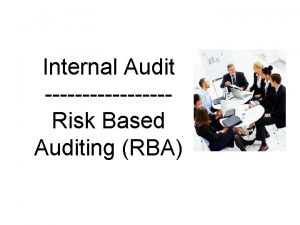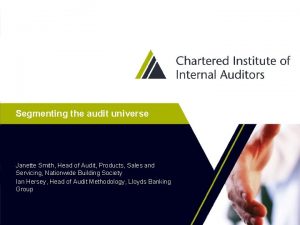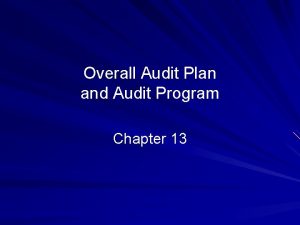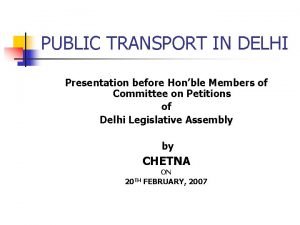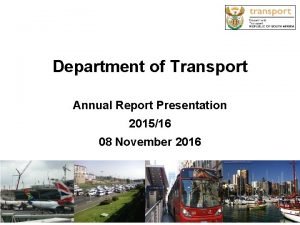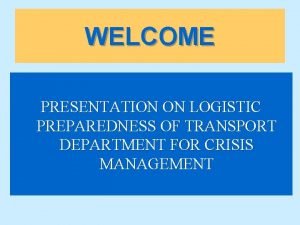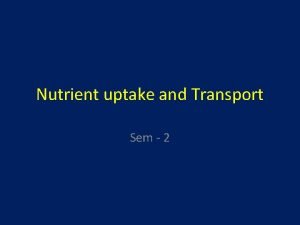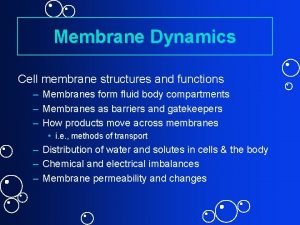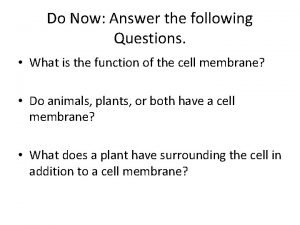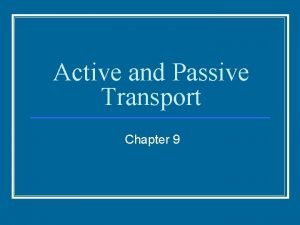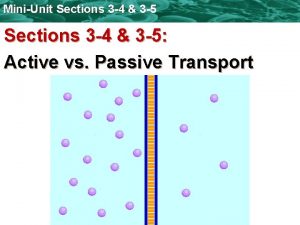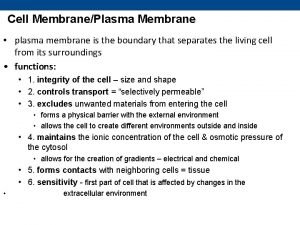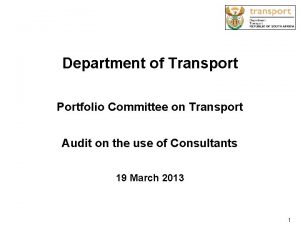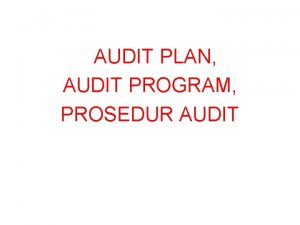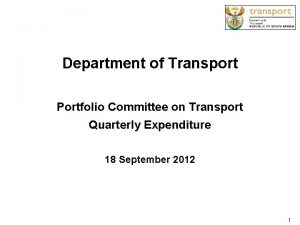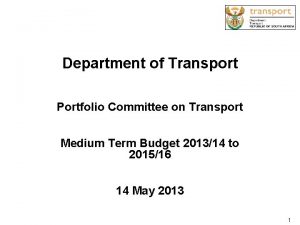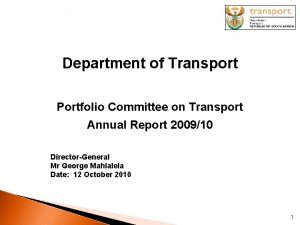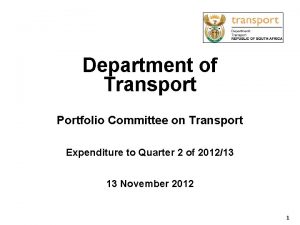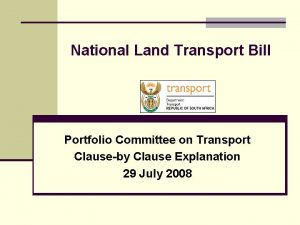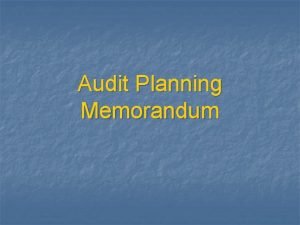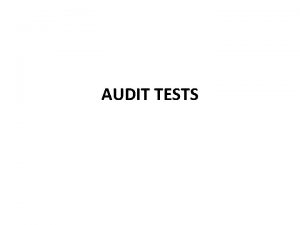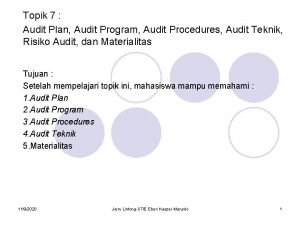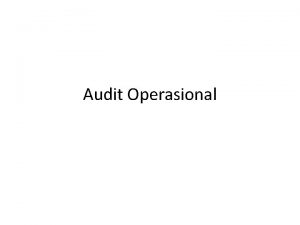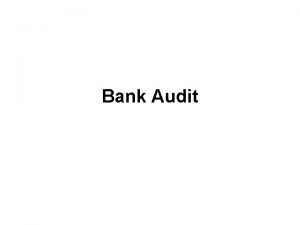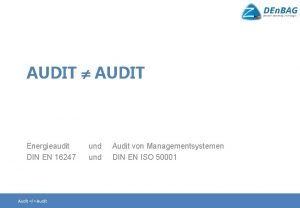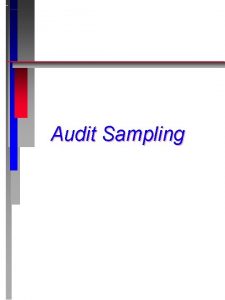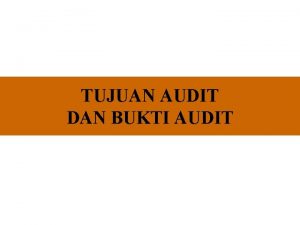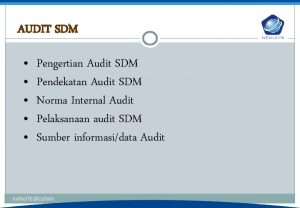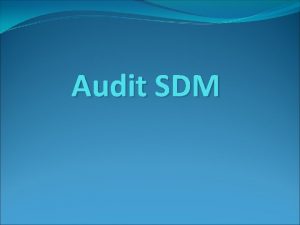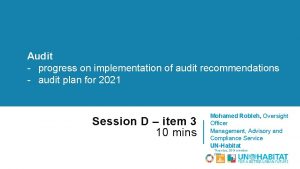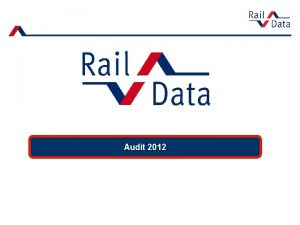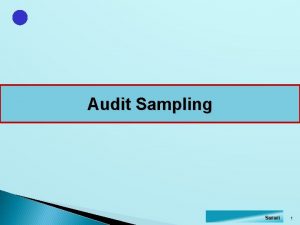Department of Transport Portfolio Committee on Transport Audit


































- Slides: 34

Department of Transport Portfolio Committee on Transport Audit on the use of Consultants 19 March 2013 1

Contents Audit focus areas Areas of deficiency Transversal audit findings: • Efficiency • Economy • Effectiveness Recommendations to the Department Commitments by the Department Key findings of the audit Progress on key findings Developments in the Department Other detailed findings and responses 2

Audit focus areas Closing and finalising projects Extension of contracts Period covered: Planning and appointme nt processes Audit focus areas Performan ce manageme nt and monitoring of 1 consultant April 2007 s Internal capacity at department s Training and transfer of skills from consultant s to employees to 31 March 2009 3

Areas of deficiency Areas where deficiencies were identified during the audit Planning Internal and capacity appointment Training Performance and management transfer of and monitoring skills Extension Closing of and contracts finalising of projects Number of contracts 7 6 0 7 8 3 4

Transversal audit findings Efficiency Economy Optimal relationship between outputs produced by consultants and resources expended by departments Competitive procurement processes and permanent staff capacity where required Effectiveness Were the objectives that informed the appointment of consultants met? 5

Transversal audit findings: Efficiency • Expected services, roles, responsibilities and deliverables relating to milestones, timelines and applicable measures were not clearly specified. • Effective oversight and internal controls were not executed before authorising payments. • There was a lack of proper project management and monitoring of consultancy projects by the department. 6

Transversal audit findings: Economy • Needs assessments were not done before commencing consultancy projects. • Competitive procurement processes were not followed. • Bid documents did not include clear specifications regarding costs and time. • Consultants were appointed where permanent capacity should have been created. 7

Transversal audit findings: Effectiveness • Planning for the provision of financial and other resources necessary for projects and their implementation was not undertaken: • • This delayed appointment processes, and resulted in the late completion of projects. • Skills transfer from consultants to departmental staff was ineffective. • There was a failure to retrospectively analyse projects to determine whether objectives were met and to determine the benefits received 8

Recommendations to the Department • Competitive bidding should be followed for all appointments. • Contracts and payments should be monitored properly to ensure that the work done meets the contractual deliverables and needs. • The periods of consultants’ appointments should be managed and monitored closely. • The department should ensure that the original contractual deliverables have been met before extending a contract. • The planning for the provision of financial and other resources necessary for projects and their implementation should be ensured. 9

Progress on recommendations to the Department • Competitive bidding processes should be followed: Done – any deviations reported and declared irregular • Contracts and payments should be monitored: Ongoing process by project managers • The periods of consultants’ appointments should be managed and monitored: Contract status report distributed monthly • Ensure that the original contractual deliverables have been met before extending a contract: All extensions considered by Bid Adjudication Committee – deviations reported & declared irregular • Planning for resources necessary for projects ensured: Procurement plans developed for 2011/12 and 2012/13 in line with Strategic Plans 10

Commitments received from the Department The Department made various commitments to implement corrective action on the following : • e. Na. TIS contract (Establishment of a trading entity) • Taxi recapitalisation project (Appointment of a trustee) The Department will consider execution and finalisation of the following projects: • Stakeholder consultations on the National Airport Development Plan • Capacity for monitoring the implementation of National Transport Master Plan by stakeholders. 11

Progress on commitments from the Department • e. Na. TIS contract (Establishment of a trading entity) Approval to create the Trading Entity obtained • Taxi recapitalisation project (Appointment of a trustee) Employee appointed as observer at Trustee meetings Monthly reports done on funds generated and spent • Stakeholder consultations on the National Airport Development Plan Consultations continuing and in process • Capacity for monitoring the implementation of National Transport Master Plan by stakeholders A Chief Directorate: Macro Sector Planning was created with four planning Directorates, one of which is the Directorate: Master Planning, Implementation and Review 12

Key findings of the audit Development of e. Na. TIS – R 575 million • Contract expired on 31 May 2007. A transfer management plan was not compiled on the planned transfer of e. Na. TIS back to the State. The effect is: • The e. Na. TIS services have not been transferred back to the Department to date. • Internal capacity lacking. The Department committed to establish a trading entity and transfer services by April 2012. • Payments of R 575 million were made to the consultant for the period June 2007 to April 2010, which included R 305, 7 million for software development. • The Department was only obliged to pay for software maintenance after expiry of the contract on 31 May 2007 and not for software development. • The Department extended the contract on 11 May 2010 for 5 years without following a competitive bidding process. 13

Key findings of the audit (Continued) Taxi recapitalisation project – R 639, 9 million Planning for the project • The scrapping allowance and extent of taxis to be scrapped was understated and not properly considered. • The extra taxis to be scrapped and inflation adjustments resulted in additional costs of R 2, 1 billion, an increase of 29% on the original budget of R 7, 5 billion. • Proceeds of scrapped taxis not accounted for by the consultant to the Department. Maritime pollution prevention response and services – R 235 million • Contract was extended three times over a period of 21 months at a total cost of R 98, 3 million due to ineffective planning by the Department. • Feasibility study done by the South African Maritime Safety 14

Key findings of the audit (Continued) Events management project – R 45, 7 million • The scope of the project was changed internally without proper approval and two more events costing R 4 million, were added to the scope of the consultant’s work. • Summons will be issued by the Department to recover R 2, 9 m from the consultant for incorrectly charging fees. Management of October Transport Month – R 14, 3 million • The prescribed minimum advertisement period was not followed. Appointment made only 5 days before the start of the event. The contract with another consultant was cancelled 13 days before the start of the event because of a competitive bidding process not being followed. • The consultant had access to information on the project before bids were invited and this gave the consultant an unfair advantage over other bidders. 15

Key findings of the audit (Continued) Formulation of National Airports Development Plan – R 10, 2 million • The project was not completed in time, as additional services were added to the scope of the project. The plan was only finished internally by the Department 13 months after it was submitted to the Department by the consultant. • The plan has not yet been approved for implementation as stakeholder consultations still needs to take place. Funding for stakeholder consultation have not yet been approved. Formulation of National Transport Master Plan – R 56 million • Insufficient positions exist on the staff establishment of the Department for the implementation, monitoring and editing of the National Master Plan. 16

Progress on Key findings Development of e. Na. TIS • Two legal opinions indicate that the extension of the contract for another 5 years from 1 May 2010 onwards is invalid. • Appointed consultants to assist with negotiations with the service provider to facilitate the transfer of services. Negotiations broke down. • A court order was awarded in favour of the service provider for the Department to pay for services rendered. The expiry date will still have to be negotiated or determined by a court of law. • A legal opinion was obtained and forensic investigators were appointed to investigate the approval of change notes. The expenditure relating to change notes that were irregularly approved was declared as irregular expenditure. The draft forensic report was received on 7 February 2013, and a report recommending disciplinary steps was sent to the Director. General. • Senior Counsel advised that the Department should take steps to 17

Progress on Key findings (Continued) Taxi recapitalisation project • The initial bid price was fixed at R 639, 928, 000 over a period of 7 years. • The Service Level Agreement was corrected. • New scrapping allowances were agreed with National Treasury. Taxis are only scrapped to the extent that funds are available. • Reports on the proceeds and distribution of funds related to the sale of scrap metal are compiled on a monthly basis. • A taxi scrapping allowance as well as the cost of scrapping taxis were secured on the baseline budget of the Department and shall continue until the taxi scrapping initiative is restructured into a land transport subsidy. • The Director: Taxi Recapitalisation was appointed as observer to the Board of Trustees. • A Steering Committee was established to facilitate the review of issues relating to the performance of the contractor and to provide a forum for joint strategic discussion. 18

Progress on Key findings (Continued) Taxi recapitalisation project (Continued) 19

Progress on Key findings (Continued) Taxi recapitalisation project (Continued) 20

Progress on Key findings (Continued) Taxi recapitalisation project (Continued) 21

Progress on Key findings (Continued) Taxi recapitalisation project (Continued) 22

Progress on Key findings (Continued) Maritime pollution prevention response and services • The Department concluded a new tender process and the same service provider was appointed, having scored the highest points of new bids received. • The feasibility study was found unaffordable and the Department could not proceed to implement the recommendations that the Department should procure its own tug boat. Events management project • The amounts were declared as irregular expenditure and the project manager was subjected to a disciplinary hearing and was eventually dismissed. • Legal action was taken by the Department to recover incorrectly charged fees. • In turn the service provider took legal action against the Department to have the fees paid to them. • Two legal opinions were obtained and a settlement agreement 23

Progress on Key findings (Continued) Management of October Transport Month • The project manager was subjected to a disciplinary hearing and was eventually dismissed. Formulation of National Airports Development Plan • The Department could not conclude all stakeholder consultations due to a lack of funds. • In the latest strategic plan, the Department planned to finalise internal consultations with public entities in 2011/12 and to finalise broader stakeholder consultations in 2012/13. • Cabinet approval and implementation is planned in 2013/14. 24

Progress on Key findings (Continued) Formulation of National Transport Master Plan • The Department increased capacity to monitor and implement the National Transport Master Plan (NATMAP). • A Chief Directorate: Macro Sector Planning was created with four planning Directorates, one of which is the Directorate: Master Planning, Implementation and Review. • Implementation of NATMAP will be done by the various authorities and implementing agents in the country. • The role of the Department will be to promote the implementation strategies and to monitor the implementation by implementing agents. 25

Developments in Department as a result of the audit • A Sub-Directorate: Contract Management was created within Supply Chain Management and a Deputy Director: Contract Management was appointed. • A Compliance Unit was created in the Directorate: Internal Control under a Sub-Directorate: Internal Control and Compliance. A Deputy Director must still be appointed. • The Directorate: Risk Management and Internal Control was split into two Directorates to enhance the implementation of internal controls and risk management, as follows: Directorate Risk Management under the Office of the Director-General, and a Directorate Internal Control and Compliance under the Office of the Chief Financial Officer. • The strategic plan was revised according to the relevant guidelines from Treasury. Consultants were appointed to review 26

Developments in Department as a result of the audit (Continued) • A Chief Directorate: Strategic Planning and Monitoring was created in the Office of the Director-General to improve on strategic planning and quarterly progress reporting. • Quarterly reports on the achievement of predetermined objectives are tabled at the Audit Committee and Executive Committee meetings. • A Guide For Managing Performance Information and Reporting in the Department and its Entities was developed and approved by the Executive Committee in July 2011. • A new Bid Adjudication Committee (BAC) was created, and new terms of reference (Rules of Procedure) was approved. • A Status Report on all active contracts are circulated monthly, indicating amongst others the start and end dates, the amount of 27

Developments in Department as a result of the audit (Continued) • A draft policy on the use of consultants was developed, which specifically addresses the matters that were raised in the audit report on the use of consultants. The draft policy must still be approved. • An electronic Contract Management System has been developed and staff was trained on the use of the system, which is able to generate exception reports and reports on the status of each contract. The system is not yet operational as the Novell platform is unstable. • A Contract Management Policy has been approved. It can however not be implemented until the Novell platform is stabilised to facilitate the implementation of the electronic Contract Management System. • Budgets were reprioritised to link to the strategic plan and 28

Developments in Department as a result of the audit (Continued) • Projects that were planned in the strategic plan and procurement plan were captured on the Basic Accounting System (BAS) to facilitate reporting on expenditure per project. • Expenditure on contracts are recorded in BAS per project to facilitate the monitoring of expenditure on contracts from BAS reports. 29

Other detailed findings and responses Finding: A panel of experts was appointed to assist Municipalities with preparations for the 2010 Soccer World Cup. Contracts were awarded without contract values despite correspondence from the Supply Chain Management unit. awarded with no ceiling amounts Response: The contracts were since the terms of reference had specified time based remuneration. Contracts were subsequently revised to indicate ceiling amounts. A Departmental circular was issued describing how to deal with panels of experts. Finding: A consultant was appointed to develop a policy discussion document. No evidence was provided that internal resources were considered. The policy was not finalised and implemented 17 months after the draft policy was provided to the Department. Response: Departmental staff worked closely with the consultant on content of the policy. The finalisation of the policy discussion document was delayed due to non-availability of critical stakeholders. The discussion document only informed policy development. A policy is only implemented when it has gone through Parliamentary 30

Other detailed findings and responses (Continued) Finding: A consultant was appointed via a closed bidding process. According to the auditors a competitive bidding process should have been followed. Response: The Department disagreed with the finding. The consultant previously developed travel demand projections on a computer model that they developed for the projections. The consultant was re-appointed to update the projections as additional information became available. It would not have been practical or cost effective to appoint another service provider, who would have had to start the work all over. Finding: A consultant was appointed via a closed bidding process to continue work that was previously done over a four year period to implement the Taxi Recapitalisation Process. The Department did not investigate whether it had internal capacity to perform the work. Response: The technical assistance to implement the programme was a once-off project over a number of years for which it was impractical to appoint staff. The consultant was re-appointed to continue the work as a natural continuation of work previously done. 31

Other detailed findings and responses (Continued) Finding: A consultant was appointed as part of a pilot project to design and construct non-motorised infrastructure at a Municipality. The consultant lost experienced staff and had to subcontract another consultant to assist with the project. The project was extended by R 311, 648 and was completed 28 months after the planned completion Advance payments to the consultant. Response: date. The extension of the workwere wasmade properly approved and was based on additional work that had to be done. The advance payments were made in accordance with the conditions of contract for civil engineering works. The Department conceded that the loss of staff of the consultant delayed the work, and that payments were not withheld due to poor performance. 32

Other detailed findings and responses (Continued) Finding: A consultant was appointed to develop an operational model for acquisition and operation of buses for the 2010 Soccer World Cup. The Department did not conduct a formal assessment to determine whether the service could be rendered in-house. Due to the poor terms of reference, bids received were materially inconsistent. The Department could not substantiate whether all recommendations of the consultant’s report was assessed and Response: It was impractical to appoint staff to perform the work, implemented. and staff did not have the expertise to develop the model. The travel demand projections in the terms of reference was widely available and projected a shortfall of ± 500 buses for the event. Options were needed to explore how the shortfall could be met. The recommendation to procure a top up fleet was chosen and implemented because it fitted perfectly with the transfer of Autopax from Transnet to the Passenger Rail Agency of South Africa. 33

Thank you 34
 Portfolio committee
Portfolio committee Portfolio committee on mineral resources and energy
Portfolio committee on mineral resources and energy Portfolio committee on basic education
Portfolio committee on basic education Portfolio committee on communications
Portfolio committee on communications Portfolio committee on basic education
Portfolio committee on basic education Portfolio committee on higher education
Portfolio committee on higher education Audit committee institute
Audit committee institute Audit committee training
Audit committee training Audit committee self assessment
Audit committee self assessment Audit committee presentation
Audit committee presentation Mike gowell
Mike gowell What is a portfolio
What is a portfolio Inland transport committee
Inland transport committee Audit swot analysis
Audit swot analysis National audit department
National audit department Perbedaan audit konvensional dengan audit berbasis risiko
Perbedaan audit konvensional dengan audit berbasis risiko Audit klinis adalah
Audit klinis adalah Beda audit medis dan audit klinis
Beda audit medis dan audit klinis Penyelesaian audit dan tanggung jawab pasca audit
Penyelesaian audit dan tanggung jawab pasca audit Hubungan ekonomisasi efisiensi dan efektivitas
Hubungan ekonomisasi efisiensi dan efektivitas Prosedur audit bottom-up dan audit top-down
Prosedur audit bottom-up dan audit top-down Difference between interim audit and final audit
Difference between interim audit and final audit Perbedaan audit konvensional dengan audit berbasis risiko
Perbedaan audit konvensional dengan audit berbasis risiko Audit latin word
Audit latin word What is the audit universe
What is the audit universe Overall audit plan
Overall audit plan Transport department
Transport department Department of transport
Department of transport Welcome transport department
Welcome transport department Primary transport and secondary transport
Primary transport and secondary transport Active transport
Active transport Now answer the following questions
Now answer the following questions Active transport vs passive transport venn diagram
Active transport vs passive transport venn diagram Endocytosis vs exocytosis
Endocytosis vs exocytosis Primary active transport vs secondary active transport
Primary active transport vs secondary active transport

